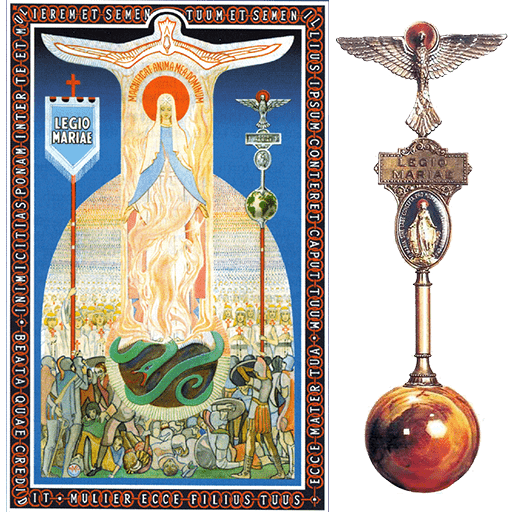The Legion and the Holy Trinity
Today is Trinity Sunday so inevitably we turn to that profound and beautiful chapter in the Handbook on the Legionary and the Holy Trinity. Often good Catholics live and love the mystery of the Holy Trinity before they try to understand it and search for images and analogies to explain it in so far as it is humanly possible. We make the sign of the Cross so many times during our Legion meetings. And of course we bless ourselves with the sign of the Cross frequently during the day. It is a simple reminder of the central truths of our faith, the mystery of the Trinity, the Incarnation, and redemption. In the name of the Father we remember that it is the love of the Father that sends the Son among us to live and die for us. In the name of the Son we remember God’s proclamation through Him that He loves us personally, passionately and infinitely. The Son affirms us by proclaiming in his passion and death that each one of us is infinitely worth dying for. And of course the whole work of redemption and our sanctification is done in the power of the Holy Spirit. He is the personal love between the Father and the Son and the heart that beats behind all creation and especially our personal human existence.
Recently, I made my first pilgrimage to Lourdes with a large group of Legionaries and I took time to meditate very carefully on what Our Lady did and said at Lourdes. In the first apparition she teaches Bernadette how to really make the sign of the Cross and they make the sign of the Cross together at every one of the apparitions. The life of Mary while on earth and now in heaven is a total immersion in the inner life of the Holy Trinity and she really wants us to live the same kind of life. The chapter in the Handbook on the Legionary and the Trinity seeks to form us in the same message as Our Lady of Lourdes.
I would love to just read the whole chapter aloud to you but time prevents that. So I will just quote St. Louis Marie de Montfort as given in the Handbook: “Let us recall here, as a proof of the dependence we ought to have on Our Blessed Lady, the example which the Father, the Son, and the Holy Spirit give of this dependence. The Father has not given and does not give his Son except by her. He has no children but by her, and communicates no graces but by her. God the Son has not been formed and engendered except by her in union with the Holy Spirit; neither does he communicate his merits and his virtues except by her. The Holy Spirit has not formed Jesus Christ except by her, neither does he form the members of our Lord’s Mystical Body except by her; and through her alone does he disperse his favours and his gifts. After so many and such pressing examples of the Most Holy Trinity, can we without an extreme blindness dispense ourselves from Mary, and not consecrate ourselves to her, and depend on her? (St. Louis-Marie de Montfort: Treatise on True Devotion, Par. 140).
Recently, I reread once more a great deal by and about Edel Quinn. I noted that her two favourite quotations from the New Testament were ‘God is Love’ from St. John and ‘In Him we live and move and have our being’ from St. Paul. If we put these two texts together, we have a magnificent and beautiful basis for a healthy interior life. Edel loved to reflect on the fact that we dwell in God’s heart and He is infinite Love. Central to her prayer life was the mystery of the indwelling of the Trinity in her heart. She habitually treasured this presence of God within her by grace even in the midst of a, sometimes, hectic life of meetings and correspondence and endless personal contacts. In her retreat notes she makes the resolution time and time again: ‘Try and adore the Holy Trinity in our soul, even in the midst of trouble or external duties.’ Or again she writes: ‘To be with Him in union with Mary - just loving Him in my soul during the day, during travelling, uniting my actions with the similar actions done by Him whilst on earth.’ I think that God has given the gift of Edel to the Legion to remind us of the primacy of contemplation in the lay apostolate, to invite us to form the habit of living the mystery of the Indwelling of the Trinity within us. We must practice the presence of God if we are to be truly lay apostles. Without this practice we can so easily become superficial in our life and engage in a mere vanity apostolate. May I recommend to you the little pamphlet by Fr. Anselm Moynihan the former vice-postulator for the Cause of Edel entitled: ‘Edel Quinn: A life in the Trinity’.
Today on the Feast day of the Holy Trinity, which takes place this year in the month of May, let us ask our Mother Mary for this gift of a great devotion to the Indwelling Trinity. Let us never cease to ask for it because it really is the secret of Mary and of all the saints, and is the secret of all Legion Apostolate.

